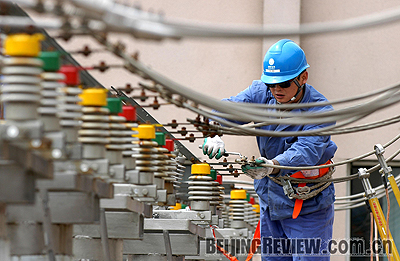|

POWER UNDER CHECK: The country’s new Anti-Monopoly Law prevents monopolistic mergers and acquisitions in various sectors, including utilities and telecommunications
China's new Anti-Monopoly Law will take effect on August 1, but the three authoritative bodies that the State Council has decided to oversee and enforce it have yet to delineate their functions.
The State Administration of Industry and Commerce (SAIC), the Ministry of Commerce (MOFCOM), and the National Development and Reform Commission (NDRC) are the three government departments that will share responsibility for enforcing the law. SAIC will set up an anti-monopoly and anti-unfair competition bureau that will monitor monopoly agreements, check for instances of market manipulation, and prevent administrative powers from intervening in market competition. MOFCOM will establish an anti-monopoly investigation bureau that will oversee company investigations to determine whether companies of a same trade are colluding with each other to monopolize markets and whether proposed mergers and acquisitions would create monopolies. NDRC's price monitoring department will be responsible for dealing with price monopolies.
Even though the State Council selected the three bodies to jointly enforce the Anti-Monopoly Law, some law experts believe it would take a long time before the law started to function as intended.
Ying Songnian, a professor at China National School of Administration, noted that although the Anti-Monopoly Law was comprehensive, its effectiveness would be hindered at first, because enforcement details had not yet been determined. After the three government bodies set up anti-monopoly departments, their first priority would be to draft relevant detailed rules for the law's enforcement, he said.
Because the three different departments would share responsibilities for overseeing the law's application and enforcement, their functions likely would overlap, experts said. Now they should work on adopting a supervision system beforehand that clearly defines each one's specific responsibilities.
| 